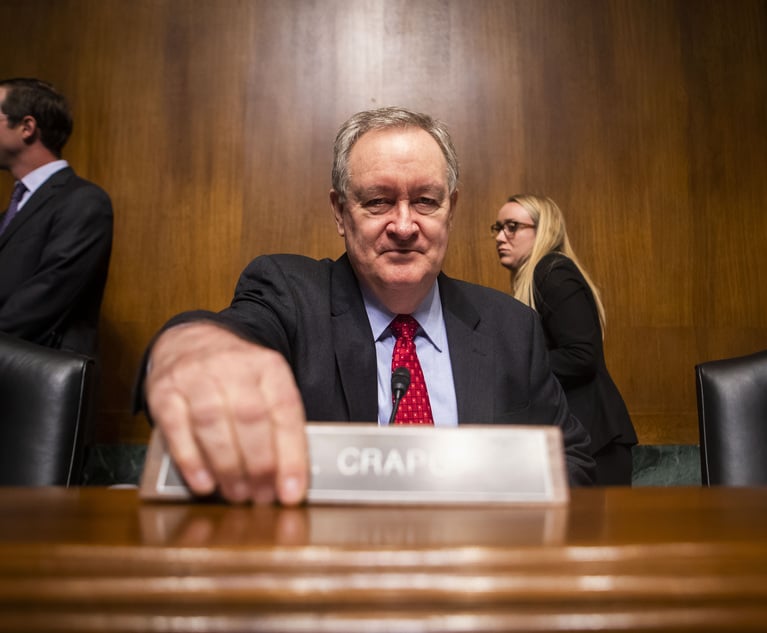As Coronavirus Ravages the Economy, Bankruptcy Attorneys Prepare for the Flood
Big Law has been anticipating an uptick in bankruptcy and restructuring work. Thanks to the COVID-19 pandemic, it may be coming sooner than expected.
March 30, 2020 at 05:00 AM
6 minute read
The original version of this story was published on The American Lawyer

Law firms have always counted on bankruptcy as a countercyclical practice in hard times. Now, those that prepared when the economy was booming may be about to get their reward.
A number of Big Law firms have been shoring up their bankruptcy and restructuring groups over the past two years, anticipating a surge in work as a cyclical economic downturn loomed on the horizon but never materialized. As the coronavirus outbreak has shut down much of the world and tanked the economy seemingly overnight, they are poised to be busier—perhaps far, far busier—than expected.
"Not surprisingly, given the unprecedented scale and scope of the crisis, I've never seen anything like it. It is resulting in an enormous increase in the volume of activity from our clients as everyone tries to figure out how to triage and deal with this crisis," said Abid Qureshi of Akin Gump Strauss Hauer & Feld. He said clients that normally work with other groups in the firm, including tax, labor, public policy, corporate and energy attorneys, who also have experience doing restructuring work for their respective industries, have been asking for advice.
"We're hearing from clients who a month ago were not expecting to need to look at restructuring alternatives and contingency planning," he said. "We're hoping the crisis will be a short one, but responsible companies need to look at all scenarios."
Kurt Mayr, head of bankruptcy and restructuring at Morgan, Lewis & Bockius, has also seen increased client activity in recent weeks, and he said there's been more and more cross-practice collaboration as the firm works to provide the best service possible to clients.
"There certainly has been an uptick in client inquiries, many of which are less immediately restructuring-related," he said. "Certainly there have been a lot of calls to our finance colleagues that don't immediately involve us, but could be harbingers of what will come."
Mayr, who joined Morgan Lewis last September to lead its bankruptcy and restructuring practice, said the coronavirus pandemic will likely affect different industries in waves that will ripple through the economy. Restaurants, hotels, airlines and other hospitality clients are feeling the immediate effects of the crisis as many cities and states have mandated that nonessential businesses close and residents stay in their homes, while suppliers will soon feel the strain of decreased demand.
"There are so many different levels being affected. The layers of the onion on this are nothing like I've ever seen before," Mayr said, adding that depending on how long the crisis continues, real estate, oil and gas and other industries will also be affected to varying degrees, keeping busy the bankruptcy teams that have recently deepened their benches.
In 2019, there were 550 lateral moves involving bankruptcy and restructuring attorneys, according to ALM Intelligence data tracking U.S.-based partners, associates and of counsel joining Am Law 200 firms. That was an increase from 413 such moves in 2018 and 364 in 2017. Since 2017, the list of firms with the largest number of bankruptcy hires has included Kirkland & Ellis; Baker McKenzie; Akin Gump; Sidley Austin; and King & Spalding, according to ALM data.
So far in 2020, there have been 69 lateral bankruptcy additions in Big Law, including Bruce Zirinsky's move back to Greenburg Traurig, but as law firms in recent weeks have shifted to remote work and begun reevaluating their budgets, that number may not increase considerably in the immediate future.
"What I'm seeing from clients is that they first had to overcome this huge challenge of how to work from home, and now that they're working from home, the focus is on what to do for clients and how to talk to them about continuity of service," said Mary K. Young, a consultant at Zeughauser Group. She said that while she's seen various bankruptcy practices gear up to handle an increased workload, the already established groups are best positioned to handle the immediate fallout.
"Certain firms are already established as bankruptcy and restructuring powerhouses," Young said. "These are established practices out doing what they do, and they're well-positioned for the work. I don't think a lot of people are thinking about [lateral hires] right now."
John Truster, co-head of lateral partner placement at Greene Levin Snyder, said that lateral movement hasn't totally ground to a halt, as some firms have continued conversations with candidates over the phone and via video. Still, with human resource officers still grappling with the logistics of having existing attorneys and staff working from home, he said, it's just not the ideal time to be bringing new lawyers into the firm, even those with valuable restructuring experience.
"I don't know if many firms have made hires in the last month or so," he said. "The firms that are mostly in place and ready to go are going to be the initial beneficiaries—think Kirkland & Ellis; Weil, Gotshal & Manges; Akin Gump; and Milbank."
At Akin Gump, Qureshi said the firm is well-staffed to handle both the immediate uptick in work as well as increased volume down the road. But the far-reaching implications of the pandemic and uncertainty about how long it will last place a big question mark on hires down the road, he said.
"This is different from other crises. Compared to the 2008 financial crisis and the Lehman Brothers bankruptcy filing, the scope is far broader. The longer it persists, the more sectors of the economy and industries will be affected," Qureshi said. "Another factor has also emerged, in that we fully expect a massive government intervention, not only in this country but across the globe. Since not much is known at this point, exactly how this all plays out is yet to be seen."
But as Ross Weil of Walker Associates pointed out, law firms will eventually adjust to the new normal. And when they're ready to ramp up hiring again, restructuring will be at the top of the list.
"During this chaos, there are still law firms that are in the process of hiring and looking to get over the finish line and get new attorneys started in the next couple of weeks," he said. "Law firms will continue hiring, but we have to reassess the new normal."
This content has been archived. It is available through our partners, LexisNexis® and Bloomberg Law.
To view this content, please continue to their sites.
Not a Lexis Subscriber?
Subscribe Now
Not a Bloomberg Law Subscriber?
Subscribe Now
NOT FOR REPRINT
© 2025 ALM Global, LLC, All Rights Reserved. Request academic re-use from www.copyright.com. All other uses, submit a request to [email protected]. For more information visit Asset & Logo Licensing.
You Might Like
View All
Am Law 200 Firms Announce Wave of D.C. Hires in White-Collar, Antitrust, Litigation Practices
3 minute read
Trump's RTO Mandate May Have Some Gov't Lawyers Polishing Their Resumes
5 minute read
Senator Plans to Reintroduce Bill to Split 9th Circuit
Law Firms Mentioned
Trending Stories
Who Got The Work
J. Brugh Lower of Gibbons has entered an appearance for industrial equipment supplier Devco Corporation in a pending trademark infringement lawsuit. The suit, accusing the defendant of selling knock-off Graco products, was filed Dec. 18 in New Jersey District Court by Rivkin Radler on behalf of Graco Inc. and Graco Minnesota. The case, assigned to U.S. District Judge Zahid N. Quraishi, is 3:24-cv-11294, Graco Inc. et al v. Devco Corporation.
Who Got The Work
Rebecca Maller-Stein and Kent A. Yalowitz of Arnold & Porter Kaye Scholer have entered their appearances for Hanaco Venture Capital and its executives, Lior Prosor and David Frankel, in a pending securities lawsuit. The action, filed on Dec. 24 in New York Southern District Court by Zell, Aron & Co. on behalf of Goldeneye Advisors, accuses the defendants of negligently and fraudulently managing the plaintiff's $1 million investment. The case, assigned to U.S. District Judge Vernon S. Broderick, is 1:24-cv-09918, Goldeneye Advisors, LLC v. Hanaco Venture Capital, Ltd. et al.
Who Got The Work
Attorneys from A&O Shearman has stepped in as defense counsel for Toronto-Dominion Bank and other defendants in a pending securities class action. The suit, filed Dec. 11 in New York Southern District Court by Bleichmar Fonti & Auld, accuses the defendants of concealing the bank's 'pervasive' deficiencies in regards to its compliance with the Bank Secrecy Act and the quality of its anti-money laundering controls. The case, assigned to U.S. District Judge Arun Subramanian, is 1:24-cv-09445, Gonzalez v. The Toronto-Dominion Bank et al.
Who Got The Work
Crown Castle International, a Pennsylvania company providing shared communications infrastructure, has turned to Luke D. Wolf of Gordon Rees Scully Mansukhani to fend off a pending breach-of-contract lawsuit. The court action, filed Nov. 25 in Michigan Eastern District Court by Hooper Hathaway PC on behalf of The Town Residences LLC, accuses Crown Castle of failing to transfer approximately $30,000 in utility payments from T-Mobile in breach of a roof-top lease and assignment agreement. The case, assigned to U.S. District Judge Susan K. Declercq, is 2:24-cv-13131, The Town Residences LLC v. T-Mobile US, Inc. et al.
Who Got The Work
Wilfred P. Coronato and Daniel M. Schwartz of McCarter & English have stepped in as defense counsel to Electrolux Home Products Inc. in a pending product liability lawsuit. The court action, filed Nov. 26 in New York Eastern District Court by Poulos Lopiccolo PC and Nagel Rice LLP on behalf of David Stern, alleges that the defendant's refrigerators’ drawers and shelving repeatedly break and fall apart within months after purchase. The case, assigned to U.S. District Judge Joan M. Azrack, is 2:24-cv-08204, Stern v. Electrolux Home Products, Inc.
Featured Firms
Law Offices of Gary Martin Hays & Associates, P.C.
(470) 294-1674
Law Offices of Mark E. Salomone
(857) 444-6468
Smith & Hassler
(713) 739-1250











